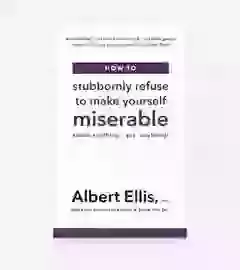How to stubbornly refuse to make yourself miserable
World-renowned therapist Dr Albert Ellis was the pioneering creator of Rational Emotive Behavior Therapy (REBT). In this edited excerpt from How to Stubbornly Refuse to Make Yourself Miserable, he considers just how achievable that claim is.
All human misery and serious emotional turmoil is quite unnecessary—not to mention unethical. When you make yourself severely anxious or depressed, you are acting against you and are being unfair and unjust to yourself.
Your disturbance also badly affects your social group. It helps to upset your relatives and friends and, to some extent, your whole community. The expense of making yourself panicked, enraged and self-pitying is enormous. In time and money lost, needless effort spent, uncalled-for mental anguish and in sabotaging others’ happiness. In foolishly frittering away potential joy during the one life you’ll ever have. What a waste.
The Human Condition
But isn’t emotional pain the human condition? Hasn’t it been with us since time immemorial? Isn’t it inevitable as long as we have the capacity to feel? No, it isn’t.
Let us not confuse painful feelings with emotional disturbance. Humans distinctly feel. Other animals feel, too, but not as delicately. Dogs, for example, seem to feel what we may call love, sadness, fear and pleasure. But how about awe? Romantic love? Creative passion? Scientific curiosity? Do dogs and chimpanzees have these feelings too? I doubt it. Our subtle, romantic, creative feelings arise from complex thoughts and philosophies. We largely create our own feelings, and we do so by learning (from our parents and others) and by inventing (in our own heads) our own sane and foolish thoughts.
We consciously and unconsciously choose to think, to feel and to act in certain self-helping and self-harming ways. And although we usually go along with (or indulge in) these tendencies, we don’t exactly have to.
We can choose to change ourselves remarkably. We are able to alter our strongest thoughts, feelings and actions. Because unlike dogs, monkeys and cockroaches, we are human. As human beings, we are born with a trait that other creatures rarely possess: the ability to think about our thinking. We are not only natural philosophers, we can philosophise about our philosophy, reason about our reasoning.
Humans have real self-awareness. We can observe and judge our own goals, desires and purposes. We can examine, review and change them. Not only that, but we can see and reflect upon our changed ideas, emotions and doings. And we can change them. And change them again and again!
Choosing Your Feelings
The more we choose to use our self-awareness and to think about our goals and desires, the more we create free will or self-determination. That also goes for our emotions, both our healthy and our disturbed feelings. Take, for instance, your own feelings of frustration and disappointment when you suffer a loss. Someone promises to give you a job, for example, or to lend you some money, and then backs down. Naturally, you feel annoyed and sad. Good. Those negative feelings acknowledge that you are not getting what you want and encourage you to look for another job or another loan.
So, your feelings of annoyance and sadness are at first uncomfortable and “bad.” In the long run, however, they tend to help you get more of what you want and less of what you don’t want. Do you have a choice of these healthy negative feelings when something goes wrong in your life? Yes. You may choose to feel very annoyed—or a little annoyed. You may choose to focus on the advantages of losing a promised job (such as the opportunity to try for a better one) and hardly feel annoyed at all. Alternatively, you may highlight the disadvantages of getting the promised job (for example, the hassle of commuting to work) and actually make yourself feel quite pleased about not getting it. You might have to work at not feeling sad and annoyed about losing the job, but you could definitely choose to do so.
Unhealthy Feelings
So, you do have a choice about your natural or normal reactions to losing a job (or a loan or anything else). Now let us suppose that you instead make yourself feel severely anxious, depressed, self-denigrated or enraged. You see that you are being treated unfairly. You upset yourself immensely about their unfairness. Can you still choose to have or not have these strong, off-the-wall feelings? Definitely, yes.
No matter how badly you act, no matter how unfairly others treat you, no matter how crummy are the conditions you live under—you virtually always have the ability and the power to change your intense feelings of anxiety, despair and hostility. Not only can you decrease them, you can practically annihilate and remove them.
The negative feelings are natural. They are exceptionally common and universal. It would be most strange if you did not feel them fairly frequently. But normal or common doesn’t mean healthy. Colds are very common. So are bruises, broken bones and infections. But they are hardly good or beneficial!
Severe anxiety, nervousness, dread and panic are unhealthy. Severity of anxiety leads to dismal over-concern, to terror and to horror. It can freeze you and help you to behave incompetently and unsocially. So, by all means, keep your feelings of concern and caution but junk your feelings of over-concern, panic and dread.
How? First, acknowledge that the two feelings are quite different, and don’t quibble or rationalize that anxiety is a healthy condition. Don’t claim that anxiety is inevitable and has to be accepted as long as you live.
Using Science to Stubbornly Refuse to Make Yourself Miserable
Modern psychology has done many experiments showing that panicked and depressed people have been able, by changing their outlooks, to overcome their disturbed feelings and to lead much happier lives. Recently, thanks to researchers who do studies of Rational Emotive Behavior Therapy, Cognitive Therapy, and other Cognitive Behavioural Therapies, more than two hundred controlled scientific studies have shown that teaching people how to change some of their negative ideas helps them to feel and act much better.
You definitely can see, dispute and surrender the irrational ideas with which you upset yourself. You can use scientific thinking to uproot your self-defeating dogmas.




